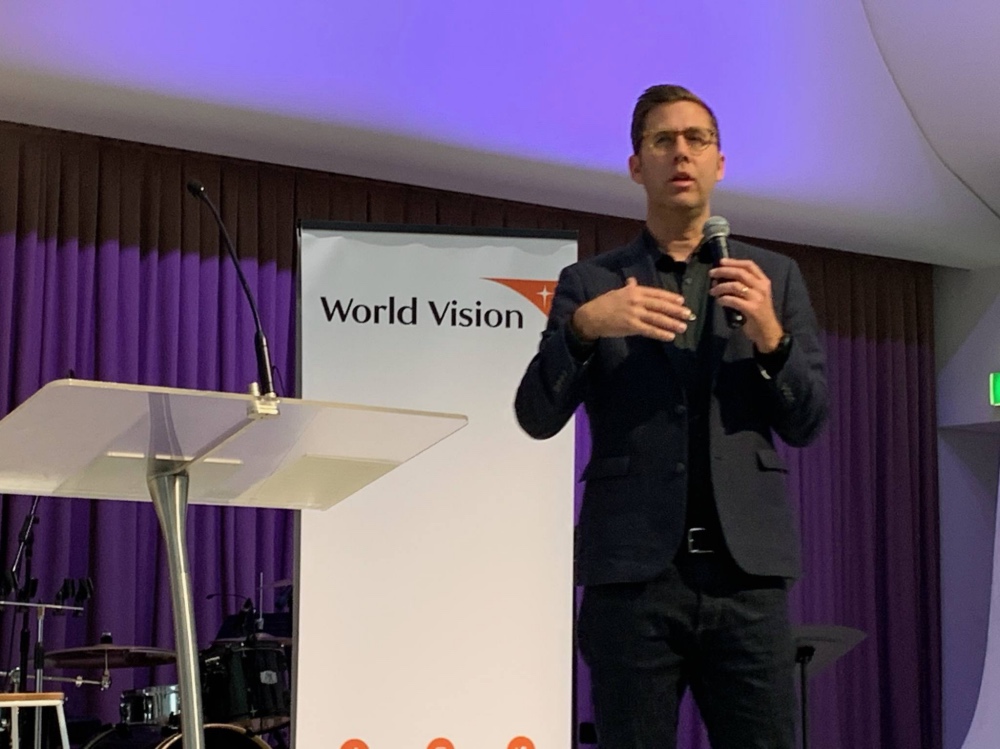
DAVID ADAMS speaks to Barna president David Kinnaman during his brief visit, hosted by World Vision Australia, to Melbourne last week to talk about the organisation’s landmark research into the “connected generation”…
When US-based Christian research firm Barna Group set out to take an in-depth look at the beliefs and attitudes of young people aged 18 to 35 in 25 nations around the world, they didn’t expect them to be so similar from one country to the next.
“One of the interesting findings was the degree to which young people in these 25 countries are very similar to each other,” reflected David Kinnaman, president at Barna, speaking to Sight last week.
“And the thesis, while it can’t be proven through social research alone, is that digital culture, the internet, connectivity, mobile devices are connecting and creating something of a generational experience. So what’s unique about this generation is that they’re growing up in a digital age…”
And while technology is disrupting everything from governments and media to economies and industries, it’s also disrupting religion and faith broadly as well as within the local church.
“And so young people are sort of navigating what it means to be religious or spiritual in that connected kind of cohort,” Kinnaman adds.

A connected generation? Young people in Zurich, Switzerland, one of the countries included in the study. PICTURE: Wyron A/Unsplash
The research represents the biggest single study based on the same survey that Barna has ever conducted. The organisation, which partnered with World Vision on the project, interviewed more than 15,300 people aged 18 to 35 in some 25 countries – from Brazil and the US and Canada to the UK, Germany, South Korea, South Africa and Australia. Some 51 per cent of those surveyed were Christians and 17 per cent described themselves as not-religious.
While the preliminary results were released in September, Kinnaman – who has also written a companion book, Faith for Exiles, which looks at the five core practices that shape the most resilient young Christian disciples in the world today – was in Australia last week to explore in greater depth some of the findings of the study in a series of special events hosted by World Vision Australia aimed at pastors and ministry leaders.
“We wanted to be able to describe a global generation and some of the issues and concerns that they have and, as we’ve done research with faith leaders around the world, we know that one of their big needs is to try and connect with younger generations…”
– David Kinnaman. president of the US-based research firm, the Barna Group.
Speaking to Sight following his first event in Melbourne, Kinnaman, who was headed to New Zealand on Sunday to conduct similar events there, says the research was partly prompted by numerous Barna studies which had, over the years, pointed to “generational gaps” between the under 35s and the over 35s, particularly when it came to the religion.
“After nearly 25 years of research in the US, one of the major findings of all that study was around the gap between those over the age of 35 and those under the age of 35 in their faith, their perspectives about religion,” he says. “The world was shifting…”
“And so, coming alongside World Vision to help describe that through social research was the goal. And we felt like there were probably similar gaps in other countries. We wanted to be able to describe a global generation and some of the issues and concerns that they have. And, as we’ve done research with faith leaders around the world, we know that one of their big needs is to try and connect with younger generations…”
Kinnaman, who describes the project as a “complicated adventure”, says that alongside the high level of similarity between the 18 to 35s – dubbed the “connected generation” in the study – from one country to the next, another unexpected finding was the “high degree” of spiritual openness found among 18 to 35s.
“We kind of expected a bit of secularism and kind of a disenchantment with Christianity [and] we found some evidence of that but not as extensively as we expected,” he says.
The survey showed that 47 per cent of all respondants are certain spiritual forces exist while 28 per cent think they may exist or are unsure and only eight per cent rejected the idea altogether. Even among those who identified as atheist, agnostic or irreligious, nearly half are open to the possibility of a spiritual realm with 18 per cent certain spiritual forces exist and 29 per cent indicating they think they might.
And while more than four in five respondants from religious cultures expressed openness to believing in spiritual forces, 62 per cent of respondants in living in countries Barna describes as “post-Christian” or “secular” – Australia, Canada, and the UK are ar all described as having a “secular climate” – shared that openness.
And while the decline in attendance among young people at traditional or mainline churches in Western nations is well known, Kinnaman points out there is a “bit of a counter-trend” to that which shows that one of the ways young people are returning to church or experienceing vitality in their faith is through liturgical settings.
“So there’s not a sort of one-size-fits-all analysis of the trends. We are living in a time of greater secularisation, especially in the West – Australia or the US – but we see that there is kind of a vibrancy among young Christians, for example…[E]ven though they may be a smaller minority…their vibrancy in faith is quite remarkable. That was another area of consistency across these countries as well.”

David Kinnaman speaking in Melbourne on 22nd October. PICTURE: Courtesy of World Vision Australia
But there are what Kinnaman calls some “sobering” statistics.
Data from the report shows that in Australia, for example, just eight per cent of those young people who grew up as a Christian remain “resilient disciples” – defined as those who attend church regularly, engage with their faith community beyond worship services, trust firmly in the authority of the Bible, are committed to Jesus personally and affirm His death and resurrection and express a desire for their faith to impact their words and actions. This compares to an average across the 25 nations of 13 per cent.
KEY FINDINGS FROM THE GLOBAL REPORT
• A quarter of 18 to 35s encounter feelings of loneliness;
• Four in 10 feel anxious about important decisions, uncertain about the future or afraid to fail;
• Only one-third often feel deeply cared for by those around them;
• Four in 10 are optimistic about the future;
• Practicing Christians and those in a Christian religious environment are more likely to feel a strong connectivity to the world;
• Fifty-five per cent say the Christian church is good for people and 52 per cent say the Christian church is important for society;
• 63 per cent of young Christians who attended church at least a few times every six months say they do so to grow in their faith; and,
• 29 per cent of young Christians say they listen to worship music on a monthy basis for spiritual growth while 28 per cent read books for this purpose.
WHILE IN AUSTRALIA…
• Practising Christians are more likely to have strong connectivity with the world than non-practicing Christians, those of other faiths and those of no faith;
• A third of 18 to 35s in Australians said faith was very important to them compared to 44 per cent across the 25 countries;
• Some 45 per cent of the Australian cohort said religion was good for people compared to a global average of 58 per cent while 39 per cent said religion was important to society compared with the global average of 53 per cent; and,
• Some 71 per cent of young Christians in Australia meet the definition of ‘church dropouts’, meaning they either grew up as a Christian and no longer affiliate with the church or they still identify as Christian but attend a place of worship infrequently. This compared with a global average of 57 per cent.
in Australia, 22 per cent of this group are now defined as “habitual churchgoers” – meaning they are active in a faith community but lack some or all the marks of a resilient faith – compared to 30 per cent globally. Some 35 per cent were “nomads’ – those who still call themselves Christian but have lapsed in faith practice – compared to 37 per cent globally – while some 35 per cent were ‘prodigals’, those who no longer identify as Christian, compared with just 21 per cent globally.
“I think going wide rather than going deep in ministry results in a high proportion of drop-outs,” notes Kinnaman. “But going deep rather than wide – you’re not going to really change the culture. So it really is necessary for the church to prepare both deep and wide sort of strategies.”
Speaking to the Australian context, Kinnaman said that the 29 per cent of 18 to 35s who said they were experiencing some of level of anxiety were above the global average as were percentages of those who reported loneliness and isolation (34 per cent in Australia compared with 23 per cent across the 25 countries).
“Mental health issues are actually above average here or, as you might think of it, below average,” he says. “So paying attention to the mental health of young adults in Australia, whether Christian or of other faiths, is important.”
Australian young people also reported above average levels of concern around ecological justice and global poverty.
It’s Kinnaman’s hope that the research will help the church connect to young people, not because they can better market or position the church in reaching young people, but because they can better “connect the heart of the Christian faith to the issues and concerns of the day in a way that’s real and authentic”.
“I think that’s what this generation is telling us they want to see happen. They want to see Christianity address the deep, thoughtful, challenging issues of society and culture, whether local or global, whether it’s poverty or corruption, or whatever the issues may be.”
RELATED: “THE CONNECTED GENERATION”: FOR ANXIOUS YOUNG ADULTS, RELIGION CAN BE A WELLNESS TOOL, SAYS STUDY
Kinnaman pointed out during an earlier press conference the desire of the connected generation to be “contributors” in the church and not just passive recipients.
He tells Sight he thinks social media is a “big part of that”.
“They’ve been conditioned, whether we like it or not, to want a voice, to have a voice…I think this idea of being a contributor is a megatrend,” he says.
“It’s a part of what’s changing the government, it’s changing media, it’s changing publishing, it’s changing public discourse – sometimes for the better but often not – and so the church is dealing with the same kinds of disruption socially. And so young people feel as though they have a voice and rightfully so. And the church has to recognise that shift…that it’s about having place of shared voice.”
~ https://theconnectedgeneration.com





